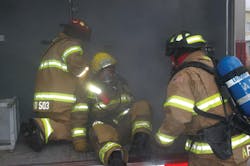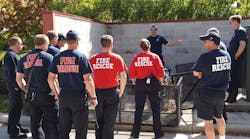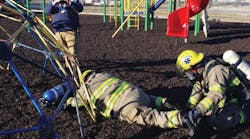As firefighters, we must take the training we attend seriously. As instructors, we must take the training we deliver seriously. As brothers and sisters of other firefighters, we must make sure that our brothers and sisters take their training seriously. Why? Because, as I have stated several times over the last two articles, our lives depend on it.
Anybody who has done this job for any serious length of time can give you several instances where they almost did not make it home. What we do not discuss, at least not as frequently as we should, is that the most common reason they did make it home was experience and training. In training, we forget all too often that the skills we practice and train on are normally routine. There will be that one call where the training you had was the difference between making it home or not. Many attribute our survival to luck and determination to survive. We don’t often mention or think about past training or even past experience. We are just glad to be safe.
The reality is that everything we do on the fireground is a learned skill. It was taught to us. From the simplest of tasks to the most complex evolutions, we had to have some training and some experience to be able to proficiently use the skill, including those that are lifesaving to us or somebody else. When that close call comes, it’s this instant recall that saves us. Your brain remembers what some instructor, senior firefighter or company officer said or did and you react. Your constant and vigilant practice of skills becomes a part of you, and you react without thought. This is why training is so vitally important and is why changing the culture and being a good instructor is very important to you and to your department. If we do not change the culture, we are equipping ourselves for failure and increasing the likelihood that somebody we know and care about or ourselves will be killed or seriously injured.
For thousands of years, militaries across the world have finely tuned the art of repetition in training and with good reason. The harder you train the more likely you are to be successful. The more times you practice a skill the more likely are to flawlessly execute it when you really need it. When we train we are training to do a job with a very high injury rate and high death rate. Most of the tasks we do, regardless of how safe we try to be, are inherently dangerous. We have to constantly train so that we are constantly safe and constantly successful.
Live to learn! With modern technology growing at its current pace, our knowledge and available information about our job at its core is increasing. The way we used to do things even 10 years ago are now considered unsafe, and there is a lot of evidence to support this. There is a lot of research out there on just about every topic related to firefighting. Read these studies; read the after action reports on LODD’s. Learn, learn, learn! Time is something all of us are short of, but taking those 15 to 20 minutes a day to read a study or an article will pay for itself over the years. Use the firehouse to discuss this stuff. Do not be an information hoarder. If you have knowledge or information, share it. The worst, possibly most dangerous, thing you can do in this profession is assume you know everything. Nobody does.
Sixteen years after my fire career started, I took a hose handling class that was suggested to me by a lieutenant in my department. Admittedly, I was a little skeptical. I have been doing this awhile and how many ways can there be to handle a hose and nozzle? I took it, and it completely changed how I view advancement and hose handling. As a result, it has changed how I teach hose and nozzle handling to all personnel. In part, he recommended this course because it contained techniques that were energy saving and not taught in any book. These were techniques he thought would be great for us to train on and possibly adopt. The hint here is that a subordinate came to me suggesting I broaden my knowledge, which I did, and it has paid off. I did not let my ego (which, as is true with most firefighters, can be rather large sometimes) stand in the way of broadening my knowledge. Another lieutenant in my department urged me to take a sports injury course, again well after my EMS career started. The course changed how I view and handle sports injuries. The more classes you take, the newer the information these classes provide. It will help you professionally and most importantly help keep us safe and improve the service we provide the citizens of the districts we protect. As an in-house instructor, you can provide this new information by doing your homework and teaching this information.
Remember “Teach don’t preach?” Part of that is knowing, and “knowing is half the battle” (I couldn’t resist); constantly learning things you thought you already knew, especially as an instructor. It broadens your knowledge base and makes sure that the information you are imparting is relevant and current.
Learn to Live. Knowledge out of a book and in practical application is great. Taking classes to gain knowledge and practical application is great. However, the reason you should be doing it, at its very core, should be to live. We learn everything we do so that we can live and so we can help others live. Learn to live!
We have discussed why you should be an agent of change in your department and how an instructor can help facilitate that change and increase the likelihood that change will stick in the last two articles. In this article we have discussed the importance and relevance of staying up to date. What we have not covered is how the leadership in the department (chiefs above the battalion level) can positively affect the culture of training in their departments.
There are several chiefs who I have served under and observed who have done this, and very successfully. They start by attending training, and while at training they let the instructor instruct. While wearing a white helmet does naturally afford them some rights that everybody else doesn’t have, having the chief participate and not attempt to facilitate a class can do wonders, especially if it’s done on a frequent basis. When the chief is engaged and contributing to the class like everybody else, while respecting the instructor’s authority to govern and teach the class, it sends a very clear and a very positive message. The chief respects his instructor and also believes in the necessity of the information.
This also means letting the instructor or training officer(s) do the job that they have been assigned (normally by the chief) and not attempt to govern training from the chief’s office. Tell the training officers what you want/need them to do, and let them do it. Undermining them by scheduling training or changing topics without consultation from those expected to deliver training sends the message (whether it’s intentional or not) that you have no faith in the officers doing the training or don’t feel that they are doing an adequate job. It gets worse the more frequently it happens. If you don’t have faith, and they are not doing an adequate job, then replace them. The key is let them do their job; not doing so does not send a positive message and can reflect poorly on the leadership. Nothing can kill a training officer’s credibility faster than when they are hear, “Hey the chief said we are training on X instead of Y and the date changed. How come?” and they have to reply, “I don’t know” or some variation thereof. There will be times when a chief has to mandate training topics and on short notice, but that is generally not the norm. If it is the norm, I would wager there are larger issues at play.
I know this sounds like I am chief bashing, and that is not at all my intent. My intent is to just give a different prospective, and demonstrate that big change can occur in small ways. Chiefs have just as big of a stake in training as we do and for all the same reasons we do (plus the added bonus of the legal ramifications). Whether they want it or not, their actions are viewed by everybody. They are in a perfect place to help us out in changing the culture. They are also busy individuals, with a lot of other things to worry about. On the flip side, training officers and instructors should encourage chiefs to participate in training, and as part of the overall curriculum of the course, have them share the relevant bigger picture issues that the company level (or battalion level) folks don’t always see or understand. But this should be worked out prior to training, not 10 minutes before or during.
Culture does not change overnight, it takes time. It takes investment from the line firefighters, company officers, training officers/instructors and chiefs. Fitting training in during a shift is challenging. The culture should be that training is important, that it is valued, that it is a vitally important way to keep us safe, to keep and improve the service we provide to the citizens in our districts and because you can never know too much and you will never know it all.
Whether you are on a department with 1,800 personnel in 50 stations or on a department with 30 personnel and one station, it doesn’t matter. Training is important. We should all make it a priority. It is our life blood. We should be living to learn, and learning to live as firefighters. We should be teaching and not preaching as instructors and all of us should be the agents of change.
Stay safe!
ERIK WOOD is a 16-year veteran of the fire service and is currently a captain with Shawnee County Fire District #2 in Auburn, KS. His responsibilities include supervision of department probationary personnel, development and instructing the department’s “rookie class” and general oversight of the department’s training program. Capt. Wood has been an IFSAC certified instructor since 2005 and he has served as an associate instructor with the University of Kansas Fire & Rescue Training. He is a member of the Kansas State Firefighters Association, State Capital Area Firefighters Association and the International Society of Fire Service Instructors.








